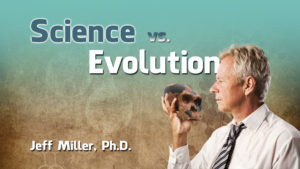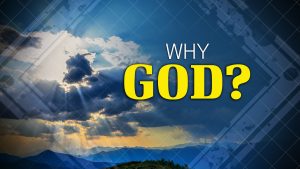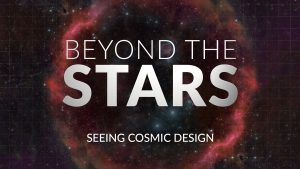-
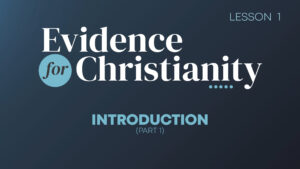
1. Introduction | Evidence for Christianity
As we begin this course of study, the logical starting place is to consider (1) what we are studying and (2) why it is so important. We are surrounded by a wide variety of philosophies and worldviews, which each carry with them implications toward questions of origin and purpose. Join Branyon May as he opens this course with the challenge of engaging your own passions and interests.
-
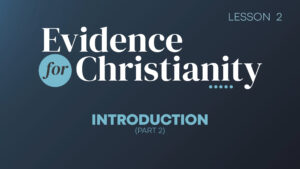
2. Introduction (Part 2) | Evidence for Christianity
In considering the Evidence for Christianity, we must consider whether an apologetic approach is authorized or desired by God. In this second lesson to introduce our study, we will consider both objections that have been presented to an apologetics approach, but also biblical examples and direct commands. Follow along as Branyon May details the Bible’s case for sanctifying the Lord God in your hearts to “always be ready to give a defense.”
-
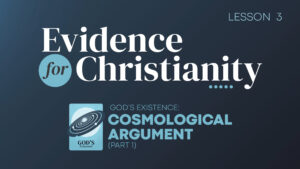
3. Cosmological Argument | Evidence for Christianity
The Cosmos or Universe is a word used to describe the entire physical existence that surrounds us. Observations of this existence lead us to ask a fundamental question, “How did it come to be?” Join Branyon May as he introduces this first line of reasoning, the Cosmological Argument, beginning to provide reason and logic to answer this question.
-
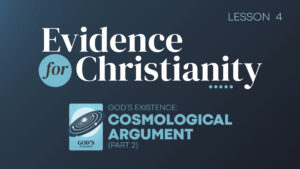
4. Cosmological Argument (Part 2) | Evidence for Christianity
Our everyday lives provide clear understanding that cause and effect is a principle that the entire material world obeys. As we consider that there are only three simple choices for the origin of the Cosmos, our observations help us understand that only created origin is fully consistent. Join Branyon May as he considers the consistent application of observations to understand the characteristics of the Creator.
-
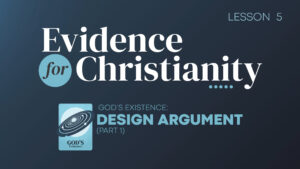
5. Design Argument | Evidence for Christianity
Not only are we surrounded by a Cosmos full of material, but we exist as part of multiple, grand, functioning systems. These systems form the basis for how the stars and planets move, why Earth is able to support life, and the behavior of every single fundamental particle. Seeing physical matter follow regular processes demands the question, “what is the origin of these processes and natural laws?” Join Branyon May in evaluating whether design exists and what it implies about the Designer.
-
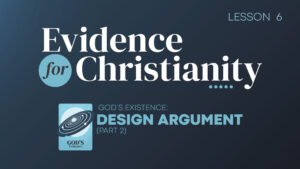
6. Design Argument (Part 2) | Evidence for Christianity
The design argument does not just say, “God did it, now let’s stop learning.” Instead the presence of design demonstrates that we should expect logical processes and repeatable outcomes with their end results being purposeful. In this class, Branyon May looks at various categories and examples of design to help identify how extensively the natural world is designed.
-

7. Moral Argument | Evidence for Christianity
Much of our lives are structured by considering the contrast between correct and incorrect, true and untrue, and what is right or wrong. These comparisons are needed, but why are we able to make such evaluations? We also make moral evaluations on a regular basis. How are we personally, or even as a society, able to make moral evaluations? Join Branyon May in considering these questions as they relate to the moral argument for God’s existence.
-
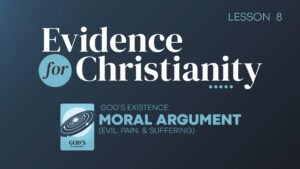
8. Moral Argument (Evil, Pain, and Suffering) | Evidence for Christianity
No one denies that our lives contain struggles of sorrow and pain. Why does evil, pain, and suffering exist in our world? Why is it present in our lives? As one of the most significant arguments against God’s existence, in both its personal impact and widespread consideration, this class focuses on the moral foundations of these undeniable issues to see that it shines a light on God’s existence not absence.
-
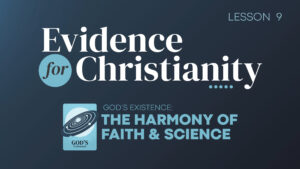
9. God's Existence: Harmony of Faith and Science | Evidence for Christianity
Are faith and science contrary, complementary, or independent of each other? Some have the view that science opposes faith, and that faith is a hindrance to science. Others simply say that each is completely independent and while they can both be in your life, they never overlap in application. In this class, Branyon demonstrates faith and science are complementary by looking at the basic meaning of both concepts and by looking at how science and faith have been applied through history.
-
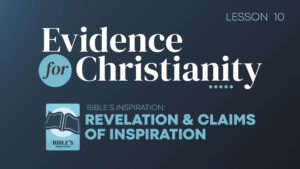
10. Bible's Inspiration: Revelation and Claims of Inspiration | Evidence for Christianity
What do we mean when it is claimed the Bible is inspired? Does the Bible even claim inspiration for itself? If it is inspired by God, what are the implications for humanity? In this class, Branyon transitions to consider the specific topic of the Bible’s inspiration and lay the foundation for why it is vital as evidence for Christianity.
-
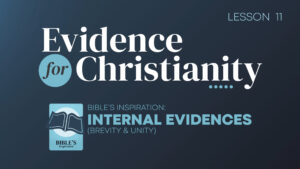
11. Bible's Inspiration: Internal Evidences (Brevity and Unity) | Evidence for Christianity
There exists internal evidence for the Bible’s inspiration; the first of which is in its very composition. The signature of a divine origin can be seen in two simple aspects: brevity and unity. Join Branyon as he takes an overview of the Bible’s contents and composition to evaluate the hallmarks of an origin beyond human production.
-
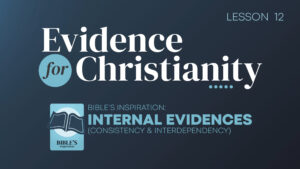
12. Bible's Inspiration: Internal Evidences (Consistency & Interdependency)
Separated by hundreds of years, how does the New Testament and Old Testament relate to each other? Did writers view each other and their content as inspired by God? This class continues the discussion of internal evidences for the Bible’s inspiration by considering both the Bible’s consistent content and the interdependency between books.
-
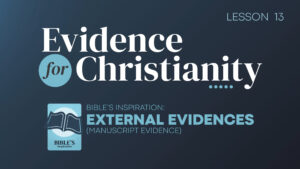
13. Bible's Inspiration: External Evidences (Manuscript Evidence) | Evidence for Christianity
The Bible is the most well-documented work in all of history. Manuscript evidence demonstrates we are not dissecting and evaluating only a scarce few fragments. Rather biblical critique occurs on the phrases, words, and even strokes of letters across thousands of ancient manuscripts. Join Branyon May in this class as the Bible’s manuscript history and factual accuracy are compared among some of the greatest written works.
-
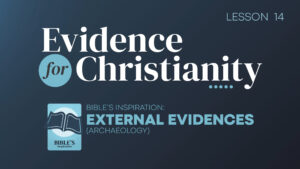
14. Bible's Inspiration: External Evidences (Archaeology) | Evidence for Christianity
How can we know the descriptions of people, places, and events in the Bible are true? Is there external evidence for what we read in its pages? Archaeology is the fascinating discipline focused on humanity’s interest with history and past civilizations. Come on an exploration with Branyon May of the artifacts, monuments, and ancient digs that connect the internal accounts of the Bible with the external evidence of history.
-
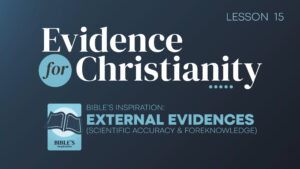
15. Bible's Inspiration: External Evidences (Scientific Accuracy & Foreknowledge)
Does the Bible make accurate descriptions of the scientific world? In evaluating the evidence for the Bible’s inspiration, accuracy should be a necessary characteristic. If the Bible describes our natural world, then it should be accurate; if it describes natural processes, then it should be accurate. Consider the scientific accuracy of the Bible as Branyon May evaluates both the natural and medical statements in the Bible.
-
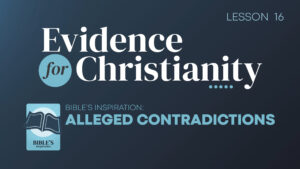
16. Bible's Inspiration: Alleged Contradictions | Evidence for Christianity
How do we evaluate and respond to claims that the Bible contains contradictions? This allegation is aimed at discrediting the aspect of inspiration. In being able to give good arguments for the Christian faith, it is sometimes necessary to respond to attacks on its integrity. In this class, Branyon lays a foundation for helping you evaluate alleged contradictions so that you can provide a reasoned response to others.
-
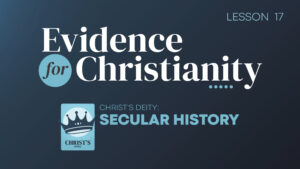
17. Christ's Deity: Secular History | Evidence for Christianity
Did Jesus really live and walk this Earth as a man? If He was a real person and one that has become so well-known across the world and through history, then we would expect to find evidence of His physical existence. So, investigate with Branyon ancient history to see what evidence there is for Jesus’ historical nature.
-
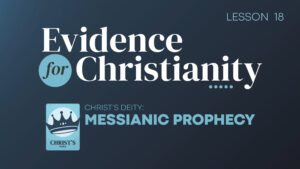
18. Christ's Deity: Messianic Prophecy | Evidence for Christianity
The fact that Jesus truly did live doesn’t immediately mean He was the Messiah, the Christ. In order for this to be true, Jesus must be the fulfillment of the inspired prophecies of the future Messiah. In this class, you will see the broad scope of Old Testament prophecies, the detailed specifics for Jesus fulfilling those prophecies, and how ancient Jewish scholars viewed the Messiah’s role. Join Branyon to see the irrefutable evidence that proves Jesus’ deity.
-
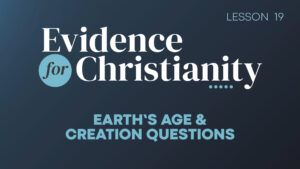
19. Earth's Age and Creation Questions | Evidence for Christianity
Having identified God’s existence as the Creator, the Bible as His inspired message, and Jesus as the prophesied Messiah, we can consider some questions of curiosity that people often have for trying to understand Creation. Questions about how the Garden of Eden, Adam and Eve, and ancient fossils factor into our understanding of history, origin, and modern populations can sometimes cause some to doubt. In this concluding lesson, join Dr. May in taking a common sense, reasonable, and consistent approach to the Bible’s answers on these topics.
Evidence for Christianity Program
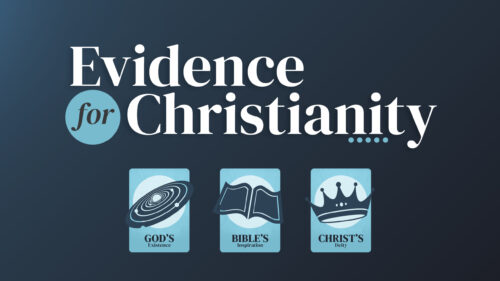
This is an in-depth course on Christian Evidences and Apologetics designed to teach logical reasoning for God’s existence, the Bible’s inspiration, and the deity of Jesus. The student will learn practical approaches for demonstrating positive evidence, defending negative attacks, and critiquing other worldviews. Through the variety of observations and aspects of life, the student will be encouraged to make application to their own interests and passions, by which their own defense will become more persuasive in its consistency. Join Branyon May (Ph.D.) in this important study of the pillars of faith. Instructor: Branyon May holds a Ph.D. in Astrophysics and works at WVBS combining a passion for science and biblical studies to help the Lord’s church.
WVBS Online Bible School Course
This program is available as a free course. If you are interested in viewing this course please visit the WVBS Online Bible School website: https://school.wvbs.org/courses/christian-evidences/






